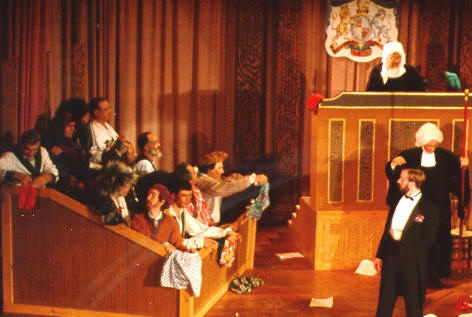From "Roughing It," by Mark Twain
I remember one of those sorrowful
farces, in Virginia which we call a jury trial. A noted desperado killed Mr.
B., a good citizen, in the most wanton and cold-blooded way. Of course the
papers were full of it, and all men capable of reading read about it. And of
course all men not deaf and dumb and idiotic talked about it. A jury list
was made out, and Mr. B.L., a prominent banker and a valued citizen, was
questioned precisely as he would have been questioned in any court in
America:
"Have you heard of this homicide?"
"Yes."
"Have you held conversations upon the subject?'
"Yes."
"Have you formed or expressed opinions about it?"
"Yes."
"Have you read the newspaper accounts of it?"
"Yes."
"We do not want you."
A minister, intelligent, esteemed, and greatly respected; a merchant
of high character and known probity; a
 mining
superintendent of intelligence and unblemished reputation; a quartz-mill
owner of excellent standing, were all questioned in the same way, and all
set aside. Each said the public talk and the newspaper reports had not so
biased his mind but that sworn testimony would overthrow his previously
formed opinion and enable him to render a verdict without prejudice and in
accordance with the facts. But of course, such men could not be trusted with
the case. Ignoramuses alone could mete out unsullied justice.
mining
superintendent of intelligence and unblemished reputation; a quartz-mill
owner of excellent standing, were all questioned in the same way, and all
set aside. Each said the public talk and the newspaper reports had not so
biased his mind but that sworn testimony would overthrow his previously
formed opinion and enable him to render a verdict without prejudice and in
accordance with the facts. But of course, such men could not be trusted with
the case. Ignoramuses alone could mete out unsullied justice.
When the peremptory challenges were all exhausted, a jury of twelve
men was enpaneled -- a jury who swore they had neither heard, read, talked
about, nor expressed an opinion concerning a murder which the very cattle in
the corrals, the Indians in the sagebrush, and the stones in the streets
were cognizant of! It was a jury composed of two desperadoes, two low
beerhouse politicians, three barkeepers, two ranchmen who could not read,
and three dull, stupid, human donkeys! It actually came out afterward that
one of these latter thought that incest and arson were the same thing.
The verdict rendered by this jury was, Not Guilty. What else could one
expect?
The jury system puts a ban upon intelligence and honesty, and a
premium upon ignorance, stupidity, and perjury. It is a shame that we must
continue to use a worthless system because it was good a thousand years ago.
In this age, when a gentleman of high social standing, intelligence, and
probity swears that testimony given under solemn oath will outweigh, with
him, street talk and newspaper reports based upon mere hearsay, he is worth
a hundred jurymen who will swear to their own ignorance and stupidity, and
justice would be far safer in his hands than in theirs. Why could not the
jury law be so altered as to give men of brains and honesty an equal chance
with fools and miscreants? Is it right to show the present favoritism to one
class of men and inflict a disability on another, in a land whose boast is
that all its citizens are free and equal? I am a candidate for the
legislature, I desire to tamper with the jury law. I wish to so alter it as
to put a premium on intelligence and character, and close the jury box
against idiots, backlogs, and people who do not read newspapers. But no
doubt I shall be defeated -- every effort I make to save the country "misses
fire."